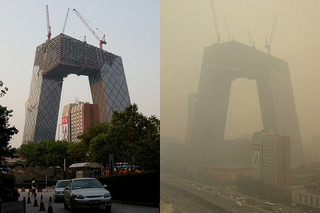Pollution In China May Increase With New Year Celebrations

With China's lunar new year celebrations approaching, China is once more one the brink of high pollution.
The possibility of further pollution has the nation in fear. Setting off fireworks is an integral part of the New Year’s celebrations--in Chinese culture, the fireworks ward off evil spirits--but the act could harm air quality.
Jan. 12 marked China’s worst pollution reading ever, according to the Air Quality Index. Beijing measured in at an air quality reading of 755--the highest reading in the country’s history, and one that is literally off the chart. The air quality index caps off at 500 with the category description of “hazardous."
Hazardous regions have a health advisory recommending that everyone avoids "all physical activity outdoors" and "people with heart or lung disease, older adults, and children should remain indoors and keep activity levels low.”
A rating of 300 is rare in the United States and usually only occurs during forest fires, said the Environmental Protection Agency.
Even Los Angeles, which is held as one of the most polluted cities in America will rarely pass 50 on the air quality index on a bad day, said the Shanghaiist.
According to The Beijing Daily, the city government's official newspaper, carried “appeals last week for residents to hold off on fireworks celebrations, saying not doing so would significantly worsen levels of PM 2.5 particle pollution forecast to be in the hazardous zone. City environmental bureau readings showed levels well above 200 in most parts of the city on Feb. 10, dangerous but still well below readings of more than 700 taken last month, when Beijing experienced 23 days of smog, up from 10 the previous January.”
Pollution is worse because of greater use of several gasoline refineries, an increase in vehicles since 2008, reports show.
Both China National Petroleum Corp and Sinopec Group acknowledge they are among the main parties that should bear responsibility for the air pollution, Reuters reported. The battle between gas refineries and the government has been ongoing for the past two decades, as a greater amount of cars requires greater production by those companies.
The amount of automobiles has increased in the past 4 years as more Chinese become wealthier and the need for a car increases. According to the Guardian, car sales jumped from 4 million in 2000 to around 18 million in 2012 alone.
The increase in the recent pollution has harmed many Beijing citizens--hospitals saw a significant rise in patients. The Chinese Meteorological Bureau said respiratory diseases increased by 10-40 percent. In Beijing alone, hospitals treated 20 percent more patients in their respiratory health departments.
The government began to clean up the pollution before the 2008 Beijing Olympics in preparation for what many titled as “China’s coming out ceremony”.
From 2007 to 2011, many of China’s larger metropolitan cities went through the "good days" of clear skies. This was largely because of regulations put in place to limit the pollution around major events like the Beijing Olympics and the 2010 World Expo in Shanghai. Some measures included shutting down thousands of factories, limiting the amount of vehicles permitted on the highways, and firing several rain-inducing missiles into the clouds (rain helps bring down the pollution).
Beijing has struggled to combat its air quality problem. The government ordered schools to cancel their outdoor activities, requested that some factories close and limited the amount of cars allowed on the road. Perhpas in the days followings the celebrations, polution will subisde as factories are forced to close and people return to their hometowns.
Reach Staff Reporter Joseph Krassenstein here.



